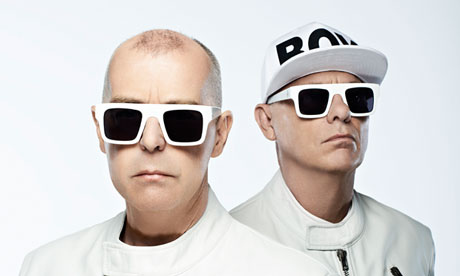Last September, Pet Shop Boys released their 11th studio album, Elysium. It was rather coolly received, perhaps as a result of its tone. It took its title from the afterlife to which the ancient Greeks thought the heroic and righteous were transported after death. Mostly written while touring Europe's sports stadiums in support of Take That, its tracks chugged along at a genteel mid-tempo, its lyrics were sombre and sour.
It featured a song protesting against the ghastliness of modern pop stars called Ego Music – "fake humility, sense of entitlement … 'I am my own demographic'" – that contrasted sharply with Requiem in Denim and Leopardskin's hymn to the artists of Neil Tennant's youth, when "everybody played themselves as a drama king or queen" and "the music was overwhelming". Another song, Your Early Stuff, bemoaned the downside of Pet Shop Boys' longevity and ongoing national treasure status: even if everyone's delighted to see you enlivening the Olympic closing ceremony by singing West End Girls while being pedalled around the stadium on an orange rickshaw, you might nevertheless feel a sense of diminishing returns setting in. In fact, Elysium could have been taken as the sound of Pet Shop Boys bidding their audience farewell: "This is our last chance for goodbye," it ended, "let the music begin."
Certainly, it sounded suspiciously like the work of two men falling out of love with pop music. On the one hand, that seems somehow unthinkable. For all the archness and wry detachment of the lyrics, the best Pet Shop Boys work has always fizzed with an almost palpable excitement at pop music's immediacy and malleability, its ability to convey complex emotions succinctly, and its inherent ridiculousness. These are, after all, men who reworked the Village People's Go West as a lament for the innocence of the pre-Aids era featuring a male voice choir, while wearing half-sphere blue and yellow helmets. On the other, you were sighingly forced to conclude, perhaps it was inevitable: Chris Lowe is 53, Neil Tennant nearly 59; their work in recent years has increasingly looked beyond pop music, stretching into film soundtracks, ballet scores and orchestral works.
And so it comes as something of a relief to find Pet Shop Boys not merely releasing a 12th studio album, but promoting it with a photograph featuring Lowe with his head entirely encased in a disco mirrorball. As statements of intent go, it's matched only by Electric's opening track, Axis, five-and-a-half minutes of writhing Italo disco-influenced synth chatter and vocodered vocals issuing a series of dancefloor commands: "Feel the power … plug it in … turn it on."
It's not the last time Electric sounds like Elysium's negative image. The album relocates a duo last seen sniping from the sidelines – albeit very wittily – at a world that seemed to be moving on without them to the centre of the action: usually a nightclub dancefloor, where they're variously to be found celebrating hedonism to a ferocious rhythm track (Shouting in the Evening) or gazing, simultaneously lovestruck and a little troubled, at the younger patrons (Fluorescent). If the lyrics of Vocal appear to be a reaffirmation of the pair's belief in the power of pop music – "expressing passion, explaining pain, aspirations for a better life are ordained … anything I want to say out loud will be sung" – the cover of Bruce Springsteen's The Last to Die, which replaces the hoarse vocals and raging E Street Band with a four-to-the-floor beat and Tennant's careful enunciation, sounds like an expression of pop's adaptability. Like their versions of Always on My Mind and Where the Streets Have No Name, you forget about the incongruity pretty quickly: it now sounds like the Pet Shop Boys wrote it, but the song's emotional impact isn't diminished at all.
Thursday, meanwhile, not only features a gorgeous combination of squelching bass and drifting, misty clouds of synthesisers and the reliable source of joy that is Chris Lowe taking to the microphone in stone-faced, Lancashire-vowelled Paninaro style, but rapper Example, who you might have been forgiven for thinking was precisely the kind of pop star Ego Music took aim at. With his calculating interview talk of "formulas" and "hitting every market" and his awful, self-regarding songs about how much cocaine he takes, he does give the impression of being quite the berk, but there's something striking about how his cocksure verse contrasts with the wistful neediness of Tennant's vocal.
Quite what provoked all this is a matter for debate. Tennant has talked about being struck by a negative iTunes review of Elysium that demanded "more banging and lasers", but it's also worth taking into account the presence of producer Stuart Price, who helmed Madonna's Confessions on a Dancefloor and is thus something of a past master at returning pop stars of a certain vintage to clubland. Whatever the reason, a band that sounded pretty weary eight months ago sound recharged and inspired. Electric's centrepiece, Love is a Bourgeois Construct, is funny and knowingly clever – it's inspired by a line in David Lodge's novel Nice Work, features references to Karl Marx and Tony Benn and uses the word "schadenfreude" and a musical lift from the 1691 opera King Arthur – as well as insanely danceable and heartbreaking. Even the cheerily belittling cab driver of Your Early Stuff might be forced to concede it's one of the greatest songs of their three-decade career.










